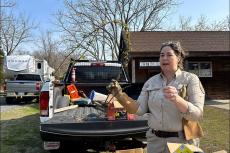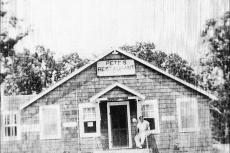With the sobering realization that another summer could come and go before the coronavirus pandemic is fully relegated to history, the East Hampton Town Board looked back at the 2020 season at the town's beaches and considered improvements that might be made for 2021.
A newly created position, that of a dedicated beach manager, was one suggestion voiced at the board's Oct. 20 meeting, as was the creation of a new lifeguarded ocean beach on Napeague, an idea floated periodically over the years.
Barring a change in state guidelines, the 2020 season's beach protocols should remain in place, said Councilman David Lys. He serves on a town advisory board convened in April to address beach matters during the pandemic along with John Rooney, head of the Parks and Recreation Department, Tony Littman and Severo Kristofich of the Buildings and Grounds Department, Town Police Chief Michael Sarlo, Ed Michels of Marine Patrol, John Ryan Jr., the chief lifeguard, and Francis Bock, clerk of the town trustees.
The group's mission was to make recommendations to the board on the safe use of a key element of the town's tourism-driven economy -- its beaches -- and it should continue its efforts, Mr. Lys said.
Looking ahead to next summer, Mr. Lys shared some of the group's recommendations at the town board meeting last week. Among them was the suggestion that hotels and resorts at unprotected beaches employ certified lifeguards. The use of drones should continue, to provide capacity information and assist with rescues, he said. The "travel lane" on beaches should remain, Mr. Lys said, and the town should add a rescue barn in Montauk for emergency services and to store emergency vehicles in the winter.
"We saw a higher level of nighttime beach use than in the past," Chief Sarlo said during the Oct. 20 meeting. Marine Patrol plans to add an officer for 2021, he said. Compliance was generally good, he said, but beach fires remain a vexing issue, with beachgoers often unsure of protocols for extinguishing them and for removing debris. The chief endorsed the suggestion of a summer beach manager, who would liaise with the town board.
The town might conduct outreach to hotels and resorts about proper disposal of beach fires, allow for a licensed vendor to set up and clear beach fire containers, add disposal locations for ashes and embers, or ban beach fires entirely, according to Mr. Lys's presentation.
The amount of trash accumulating on beaches at night was significantly up this year, and Mr. Lys recommended a morning run to collect it, which may require a new vehicle. Due to concerns about the coronavirus, beachgoers were reluctant to push trash completely into receptacles; new receptacle designs, without a flap to be pushed, should be considered, he said.
Atlantic Avenue Beach in Amagansett had no paid parking this year. Mr. Lys suggested a specific number of paid parking spaces next year, which he predicted would result in fewer people traveling to Montauk for paid parking there (the Kirk Park Beach lot was staffed this year, generating more than $101,000 in fees) and increasing capacity. Beachgoers' use of parking at the Lamb Building and the East Hampton Town Marine Museum, both on Bluff Road in Amagansett, must be addressed, he said. Long-term changes to parking south of Montauk's Main Street should be considered for the sake of public safety in that often-congested area, he said, and parking at bay beaches must be regularly enforced.
"You have to take this pandemic seriously," Mr. Lys said, "and use the expertise on staff here" in the service of public safety. "We are very fortunate to have that knowledge in our town departments. I think we were ahead of Covid in designing a beach action plan."
The beach advisory group's recommendations were sent to the board in May, and the board approved them just prior to Memorial Day weekend. In coordination with counterparts at Southampton Town, Suffolk County, and across Long Island, the recommendations included a "soft" opening, with four ocean beaches opened on Memorial Day weekend and initially on weekends only. Bay beaches and downtown Montauk's ocean beach opened in June.
Lifeguards' ordinary scope of responsibilities was expanded to help manage crowds and ensure social distancing, and employees of parks and recreation, as well as buildings and grounds, helped ensure safety at beach entrances, parking lots, and comfort stations, which were cleaned more often and their occupancy restricted. "Beach ambassadors" posted at entrances helped to maintain order, and lifeguards received personal protective equipment as well as training in safe rescue procedures. Lifeguard stands were equipped with hand-washing stations, soap, and hand sanitizer.
A "travel lane" from the beach grass line extending 20 feet seaward was set aside to provide both an area for enforcement to traverse and for beachgoers' socially distanced egress.
For beachgoers, face coverings were required in parking lots and comfort stations, and contact sports and groupings outside of families were supposed to be prohibited. New signs informed the public about pandemic protocols. The sale of nonresident parking permits was discontinued, parking was prohibited on many unrestricted streets in downtown Montauk, and sections of parking lots were cordoned to decrease capacity, adjusted as Long Island moved through the New York State-directed four-phase reopening.
The advisory group reconvened after Memorial Day and biweekly thereafter, keeping an eye on an infection rate that continued to fall from an early-spring peak.
With few incidents observed, late-summer weather cooperating, and school openings delayed, beaches remained guarded for a few weeks beyond their traditional closing.
The pandemic presented "a situation none of us ever experienced before," Supervisor Peter Van Scoyoc said. "It forced us to focus and coordinate our efforts. We had to review every aspect of how we do business" in order to "have the best possible beach season. The fact that we had a successful season was certainly no accident."



